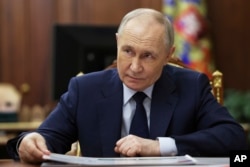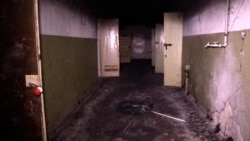An 18-year-old Ukrainian recently told RFE/RL how she was interrogated by Russian security officers as she tried to leave Russian-occupied Ukraine. "Why don't you want to marry a Russian military man?" she was asked.
Speaking to RFE/RL's Ukrainian Service , the young woman chose to remain anonymous because she still has relatives in Russian-held areas in the eastern part of the country.
Her account matches those of others that give a picture of the arduous journeys, threats, and intimidation faced by Ukrainian civilians if they choose to leave their homes in towns and cities seized by Russian forces.
Together with her mother, she drove through occupied Mariupol, Russia, and Belarus. The encounter with Russia's Federal Security Service (FSB) was the worst moment.
"When we went to the border control, we were immediately taken for questioning. They interrogated us for a very long time," she said.
As well as harassing her about her marriage prospects, the FSB men also threatened her mother, telling her: "You won't come back. You'll leave all your relatives who are here, you won't be able to contact them, and your relatives will have problems."
A volunteer organization called Humanity helped the two women make their journey. The group's co-founder, Stefan Vorontsov, said the number of requests to leave was increasing.
'No Future For Children'
This may be linked by moves by Russia to tighten its control in areas it has occupied since its full-scale invasion in 2022.
On March 20, Russian President Vladimir Putin issued a decree under which Ukrainian citizens had to "legalize" their immigration status or leave Russia by September 10.
Russian occupation authorities in Ukraine are expected to apply these rules to Ukrainians living there in their own homes. In other words, Ukrainians face a choice: Get a Russian passport, register as an immigrant, or leave.
"This is the expulsion of the Ukrainian people from our territories, from Ukrainian territories. This is what is happening now," said Vorontsov.
Around a third of those leaving are young people.
"People do not want to stay there. There is no future for children there. Zero," he said, adding that people have been living "in constant stress" for three years.
RFE/RL also spoke to a woman who fled a Russian-occupied area of the Kherson region in southern Ukraine. She also chose to remain anonymous.
At first, she said, "we believed [the occupation] would soon be over." Later, people who had fled started to return, because life in government-controlled areas was difficult. "We simply accepted the situation."
But then, her feelings changed.
"When the third anniversary of the full-scale invasion was approaching, we realized it would last for a long time. They began summoning teenagers for military registration. I was worried about my children and finally decided to leave," she said.
Her journey took her through a filtration camp in occupied Crimea. Russian security forces checked her phones and interrogated her for long periods, asking in particular if she had any acquaintances in the Ukrainian armed forces.
Vorontsov said the fear of filtration camps was a factor deterring people from trying to leave.
"There's always the risk that something will go wrong during filtration. [Russian security forces] might latch onto an emotional reaction -- they use psychological pressure," he said.
"Sometimes, fear and desperation can lead people to say too much or take the blame for something they didn't do. That's when people start disappearing, or they're sent back [to the occupied territory]."














